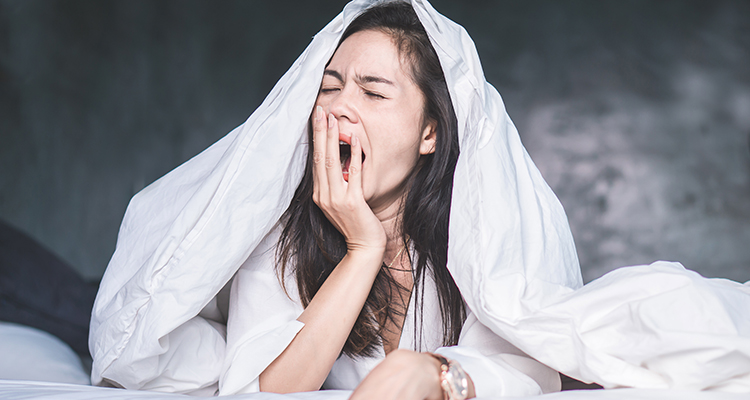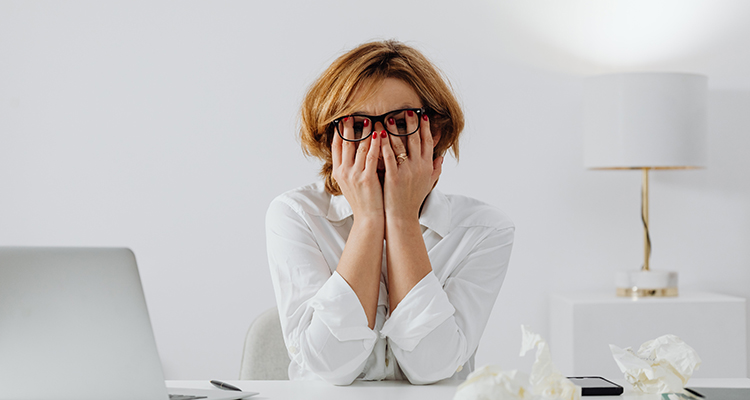How Does Gabapentin (Neurontin) Help Insomnia?

Can’t remember the last time you got a good night’s sleep without tossing-and-turning or waking up frequently throughout the night?
Well, you are definitely not alone.
One of the hallmark signs of insomnia is being unable to fall asleep at a decent hour and/or being unable to stay asleep all night long. And, when insomniacs are able to fall asleep, it’s usually a restless sleep or a “broken sleep” (waking up during the night). In fact, it can be a real struggle to get a full 7-8 hours of sleep when you suffer from insomnia.
Although, this sleep disorder is most common in the adult population, children, even as young as infants, can also experience “sleeplessness.” And, while it is “normal” to have occasional bouts of insomnia, it becomes a problem when it occurs most nights. Inadequate sleep can wreak havoc on your physical and mental health.
“Sleeplessness” typically leads to next-day grogginess, sleepiness, irritability, forgetfulness, confusion, and laziness. One sleep remedy often prescribed by doctors to help combat insomnia is gabapentin or Neurontin. Gabapentin not only helps you fall asleep faster; it also helps you stay asleep all night long – without the tossing-and-turning and frequent wake-ups.
Content
Check out our video on Gabapentin for insomnia!
What is Insomnia?

Insomnia is a sleep condition that affects approximately 35% of adults. When you have insomnia, you have a hard time falling asleep, staying asleep, and/or getting quality sleep. You may also awaken too early and be unable to fall back asleep.
Although, occasional insomnia is nothing to fret about, chronic insomnia can lead to a host of health problems, such as depression, anxiety, headaches, severe daytime sleepiness, gastrointestinal distress, body aches, high blood pressure, confusion, and/or lethargy. Sleep deprivation can also increase your risk of accidents.
The cause of insomnia varies from person-to-person; however, it can arise due to stress, a 3rd shift work schedule, an inadequate or non-existent bedtime schedule, routine, or habits, chronic pain, medication side-effects, an injury or chronic condition, anxiety, depression, neurological conditions, like ADHD or restless-leg syndrome, or other sleep disorders.
For many insomniacs, the cause lies in one or more of the factors listed above. Keep in mind, however, that poor sleep can trigger or worsen other health conditions, leading to a viscous cycle of “sleeplessness” and pain. Studies suggest that insomnia may involve a state of hyperarousal, (abnormal or excessive arousal or internal excitement) caused by mental or physical factors, that prevents a person from falling and/or staying asleep throughout the night.
What is Gabapentin (Neurontin)?

Gabapentin, also referred to a Neurontin, is an antiepileptic/anticonvulsant prescription medication, primarily used to treat seizures. It can also help people fall asleep quicker and stay asleep longer by increasing slow-wave sleep (helping you enter into a deeper sleep).
Gabapentin is not only relatively safe; it is also highly effective at spurring sound sleep. Thus, doctors also prescribe it for insomnia, although this is an “off-label” use. In other words, it has not been approved by the FDA for the treatment of insomnia. It has been approved by the FDA for the treatment of seizures and postherpetic neuralgia.
Gabapentin can be used to treat pain and seizures in adults and in children who are at least 3-years-old. One of the most common side-effects is sleepiness, so it can be beneficial for people suffering from chronic insomnia. In fact, approximately 19% of people over the age of 12 and approximately 21% of those over the age of 12 reported sleepiness as a common side-effect of gabapentin.
How Does Gabapentin Work?

The jury is still out.
Previous studies hinted that gabapentin works by interacting or “communicating” with GABA receptors in your central nervous system (CNS). However, current research indicates that is not true. The truth is experts don’t fully understand how gabapentin works, although they have learned that it can increase calcium levels, possibly reducing or stopping seizures. This is important because low levels of calcium can affect your brain chemistry.
In regards to postherpetic neuralgia (nerve pain), it is believed that gabapentin “dulls” or decreases the nerve sensitivity that often accompanies discomfort or pain. Thus, gabapentin helps people experience less pain and lower nerve sensitivity, so their bodies can rest and heal. And, because these individuals no longer experience intense nerve sensitivity and/or excruciating pain, they also no longer feel as anxious as before.
When is Gabapentin Prescribed?

Gabapentin is primarily used to prevent, reduce, or stop seizures.
However, studies indicate that gabapentin may also beneficial for the following “off label” conditions:
- Neuropathic pain (nerve pain)
- Migraines
- Fibromyalgia
- Hot flashes
- Teeth-grinding
- Alcoholism
- Anxiety
- Restless leg syndrome (RLS)
- Insomnia
Note: Keep in mind that the FDA has only approved gabapentin for the treatment of seizures and some forms of neuropathic pain.
Will Gabapentin Help Me Get Some Sleep?
Possibly!
Researchers suggest that gabapentin improves slow-wave sleep by putting you into a deeper sleep, thereby increasing your overall sleep time. It typically takes a few hours for immediate-release gabapentin to fully kick-in. It is recommended that you take this medication 3x a day for maximum results.
How Much Gabapentin Should I Take for Insomnia?

Most doctors will prescribe between 100mg and 400mg of gabapentin for insomnia. Typically, a doctor will start you off with the lowest possible dose and then gradually increase it, as needed. When used for insomnia, gabapentin should be taken once a day shortly before bed. Always take it as directed by your doctor.
In other words, don’t skip doses, stop taking it, or alter your dosage in any way without consulting with your doctor first. Keep in mind that if you taking gabapentin at night, you may feel drowsy or groggy the next day. If this occurs, your doctor may advise you not to operate machinery or drive until your body becomes acclimated to the medicine.
Listed below are the general dosages for the following conditions:
Epilepsy – Adults
- Initial Dose – Day 1: 300mg (by mouth) 1x a day, Day 2: 300mg (by mouth) 2x a day, Day 3: 300mg (by mouth) 3x a day
- Maintenance Dose – 300mg to 600mg (by mouth) 3x a day
- Maximum Dose – 3600mg (by mouth) divided into 3 doses, per day
Note: The time between doses for the maximum dose should not exceed 12-hours.
Children – 0-3 years old
- Not recommended
Postherpetic Neuralgia – Adults
- Initial Dose – Day 1: 300mg (by mouth) 1x a day, Day 2: 300mg (by mouth) 2x times a day, Day 3: 300mg (by mouth) 3x a day with an option to increase, if needed for pain relief
- Maximum Dose – 600mg (by mouth) 3x a day
Children – 3-12 years old
- Initial Dose – 10-15mg, divided into 3 doses, per dayEffective Dose – This dosage can be increased, if needed, over the course of 3 days.
- Effective Dose – Children, between the ages of 3 and 4, are typically prescribed 40mg, divided into 3 doses, per day.
- Effective Dose – Children, who are 5-years-old and older, are typically prescribed 25-35mg, divided into 3 doses, per day.
Children – 12-18 years old
- Initial Dose – Day 1: 300mg (by mouth), Day 2: 300mg (by mouth) 2x a day, Day 3: 300mg (by mouth) 3x a day
- Maintenance Dose – 900mg (mouth) divided into 3 doses, per day – this dose can be increased up to 1800 mg/per day, if needed.
- Studies have indicated that dosages up to 2400 mg/per day have been well-tolerated in gabapentin users. Researchers have also found that even larger doses (3600mg), per day, have shown success for short amounts of time. This dosage also appears to be well-tolerated.
Note: The time between doses when taken 3x a day should not exceed 12-hours.
How Should Gabapentin Be Taken?
It is important to take gabapentin exactly as prescribed. Do not take more or less of this medication then your doctor instructs. Keep in mind that if your doctor changes the strength or brand of your form of gabapentin, your dosage may also need to be tweaked. Consult with your pharmacist if you have questions or concerns about this medication. Gabapentin can be taken with or without food.

It is possible to break a gabapentin tablet or capsule in-half and take it in 2 doses, but only do so if instructed by your doctor. Any broken tablets or capsules should be used within 3 days – a longer time may alter its effectiveness. Otherwise, do not crush, open, break, or chew the tablet or capsule. Swallow the medication whole.
If you have been prescribed a liquid form of gabapentin, measure it carefully. If possible, use a dosage syringe or a dosing cup – not a spoon. Also, do not stop taking gabapentin when you start feeling better. Abruptly stopping this medication can trigger seizures. Thus, consult your doctor before you begin tapering-off the medication.
You may also want to purchase and carry or wear a medical identification badge or bracelet – in case of an emergency.
Note: Gabapentin can affect certain lab and test results, so inform all of your doctors that you are taking gabapentin.
Are There Any Side-Effects Associated with Gabapentin?

Yes, there are a few gabapentin side-effects you should be aware of, such as:
- Clumsiness or a lack of coordination
- Viruses and infections
- Sleepiness or drowsiness
- Gastrointestinal distress – nausea and vomiting, upset stomach, abdominal pain, diarrhea
- Speech delays or problems speaking clearly
- Tremors or “shakiness”
- Edema or swelling in the limbs, especially in the legs and feet
- Fatigue or tiredness
- Fever
- Mobility issues – jerky or stiff movements
- Vision problems – Double vision or unusual eye movements
- Shortness of breath
- Allergic reactions involving a swollen throat or face
Are There Any Warnings I Should Be Aware of?
Yes, there are a few things you should be aware, such as:

- Some people may experience suicidal ideation (suicidal thoughts or attempts) or a sudden change in behavior while taking gabapentin.
- It is unknown if gabapentin will harm a woman’s unborn baby. So, inform your doctor if you plan to get pregnant or if you become pregnant while on this medication.
- If you are taking gabapentin for seizures do not suddenly stop taking the medication once you become pregnant without consulting with your doctor. Having a seizure while pregnant can harm both mother and baby.
- It is unknown if this medication transfers through the mother’s breastmilk, so consult your doctor if you plan to breastfeed, while taking gabapentin.
- Gabapentin can cause life-threatening breathing problems, so seek emergency medical care if your breathing slows, you have shortness of breath, your lips turn blue, or you have a hard time waking-up. Understand that the highest risk is amongst older adults and people suffering from COPD.
What Happens If I Suddenly Stop Taking Gabapentin?

If you suddenly stop taking gabapentin, you may experience the following withdrawal symptoms:
- Irritability
- Anger or agitation
- Anxiety or depression
- Photophobia or a sensitivity to light
- Headaches or migraines
- Confusion
- Excessive perspiration (sweating)
- Fever
- Accelerated heart rate or heart palpitations
- Immobility
- Restlessness
- Chronic, life-threatening seizures
- Hallucinations and delusions
- Insomnia
- Gastrointestinal distress – nausea and vomiting, upset stomach, and/or diarrhea
- Physical pain
Note: Gabapentin withdrawal typically occurs 12-48 hours after the last dose. However, the detox time varies from person-to-person.
Should I Worry About Drug Interactions?
Yes, you should always research drug interactions before taking a medication and gabapentin is no exception. Consult your doctor if you are taking an opioid or narcotic, OTC or prescription sleeping pills, allergy medications like Benadryl, a muscle relaxer, or an anti-depressant or anti-seizure medication. Also, inform your doctor of any other OTC or prescription medications, vitamins, or herbal supplements you are taking.
What Do the Experts Say?

Several studies have been conducted on the safety and effectiveness of taking gabapentin for sleep issues.
The results of these studies are listed below:
- According to a 2010 study, gabapentin can improve sleep quality and slow-wave sleep (deep sleep), lower your risk of spontaneous nighttime wake-ups, and prevent premature morning awakenings. Gabapentin is especially effective for those struggling with primary insomnia and slow-wave sleep disruptions.
- Another study found that gabapentin can significantly improve sleep quality and reduce sleep issues, such as falling asleep too late, continuously tossing-and-turning, waking up multiple times throughout the night, and/or waking-up too early. Researchers also concluded that gabapentin is just as effective as clonazepam in the treatment of depression-related “sleeplessness.”
- Similarly, a 2014 study found that individuals, who suffered from occasional bouts of disrupted sleep, experienced a noticeable improvement (falling asleep more quickly and sleeping longer and deeper) in their sleep quality after taking gabapentin.
- Likewise, a 2013 study found that gabapentin may be a highly-effective treatment for sleep bruxism, especially in insomniacs, who suffer from poor sleep quality (an inability to fall and stay asleep all night long).
- A 2002 study also found that gabapentin can enhance slow-wave sleep (deep sleep) in healthy adults. Researchers suggest that gabapentin may be more effective and less disruptive than previous sleep aids.
- In addition, two small studies found that gabapentin may help some people, struggling from primary insomnia and occasional bouts of “sleeplessness” increase their overall sleep time and decrease premature morning wakefulness.
- Researchers also suggest that gabapentin may improve sleep in people, who struggle with other medical conditions that affect your nerves, muscle, and/or joints and cause discomfort or pain. Emotional or physical distress can prevent you from getting sound sleep.
What Do Gabapentin Users Say?

Personal accounts are the best way to learn the true effects of gabapentin for insomnia.
Some of these personal accounts are listed below:
KeKe
Rating: 10/10
“I have suffered with anxiety and depression for a long time, not fully understanding what was wrong with me, while also self-medicating with drugs and alcohol. I engaged in general avoidance. Last year, it became too much to bear. I had just started a new career and was in grad school. I also had just moved to a new city and was trying to survive a pandemic at the same time. My doctor put me on Lexapro, which seemed pretty awful and wasn’t quite right.
I then went to a psychiatrist to see if there was something more “appropriate” for my conditions, and she added gabapentin to the Lexapro. And, I almost instantly felt so much better. Because of gabapentin, I am now able to be myself and speak without fear of saying the wrong thing or overanalyzing every detail. My self-consciousness has practically disappeared. Now, I feel a general sense of peace and calm and my insomnia is gone! I hope it lasts!”
Sarah
Rating: 10/10
“I have crippling anxiety. I’ve tried soooo many other medications. Benzos not only made me too tired to do anything, I just didn’t feel not myself after taking them. However, with gabapentin, I somehow feel relaxed and I have energy. And, my social anxiety is almost non-existent. Gabapentin is truly a miracle drug. I just wish more people knew about it for anxiety!”
Josiah
Rating: 3/10
“I experienced awful nightmares once I quit gabapentin. In the past, I quit Xanax, alcohol, cocaine, and a few drugs and they were “cake walks” as compared to gabapentin. I have never felt such anxiety and hopelessness than I did while trying to quit gabapentin.”
Barb
Rating: 1/10
“I was put on gabapentin for “off-label” anxiety and depression. I had very severe side-effects from gabapentin, which doctors misdiagnosed as” mini strokes.” It was later discovered that the side-effects were from gabapentin. I am now going thru a very slow weaning process and am having severe withdrawal symptoms.
Before, I had no pain, but now, I have neuropathy and am suffering with trigeminal neuralgia. It is so awful and doctors say it may take me a year to completely wean-off gabapentin. I am so mad. I can’t work anymore. It has severely damaged my nervous system and I worry about long-term damage. I was on 900mg daily, which isn’t that large of a dose. Gabapentin has ruined my life.”
What Are Some Natural Sleep Aids I Can Use to Help Me Sleep?

There are several natural sleep aids you can use to help you get some sleep.
Some of these aids include:
- Reading while lying in bed
- Meditating or repeating a mantra
- Getting plenty of exercise throughout the day
- Removing distractions – i.e., television, bright lights, electronic devices, etc.
- Consuming healthy foods
- Refraining from eating too much or eating too late
- Investing in an online sleep program, like Somnus Therapy
- Developing a consistent sleep schedule and bedtime routine
Summary
Overall, studies indicate that gabapentin is not only safe, but also highly-effective for a wide-variety of FDA-approved and “off-label” conditions and ailments, such as seizures, fibromyalgia, nerve pain, and anxiety. It has also shown promise as a safe and effective treatment for insomnia. In fact, researchers have found that gabapentin may improve sleep quality, helping insomniacs fall asleep quicker and sleep longer.
But, although, experts assert that gabapentin can be used as a long-term sleep medication, there is also a risk of withdrawal symptoms, which could prevent you from falling and staying asleep at night. Thus, it is important to consult with your doctor, if you struggle with a mental condition, substance abuse or addiction, or epilepsy or seizures and plan to stop taking gabapentin.
Still, if you haven’t had a good night’s sleep in a while, gabapentin may improve your condition and help you sleep like a baby for the first time in a very long time.
References
- Keeler, J. (2021). The dangers of sleep deprivation. Somnus Therapy. Retrieved from https://somnustherapy.com/the-dangers-of-sleep-deprivation/
- Medline Plus. (2021). Gabapentin. Retrieved from https://medlineplus.gov/druginfo/meds/a694007.html
- Medic, G., Wille, M., & Hemels, M. E. (2017). Short- and long-term health consequences of sleep disruption. Nature and Science of Sleep, 9, 151–161. Retrieved from https://doi.org/10.2147/NSS.S134864
- Bonnet, M. H. & Arand, D. L. (1997). Hyperarousal and insomnia. Sleep Med Review, 1(2), 97-108. Retrieved from https://pubmed.ncbi.nlm.nih.gov/15310517/
- Chao, S. (2020). Does gabapentin help you sleep? Drugs.com. Retrieved from https://www.drugs.com/medical-answers/gabapentin-you-sleep-3553166/
- Peckham, A. M., Evoy, K. E., Ochs, L., & Covvey, J. R. (2018). Gabapentin for Off-Label Use: Evidence-Based or Cause for Concern? Substance Abuse,12. Retrieved from https://pubmed.ncbi.nlm.nih.gov/30262984/
- Foldvary-Schaefer, N., De Leon Sanchez, I., Karafa, M., Mascha, E., Dinner, D.,& Morris, H. H. (2002). Gabapentin increases slow-wave sleep in normal adults. Epilepsia, 43(12),1493-1497. Retrieved from https://pubmed.ncbi.nlm.nih.gov/12460250/
- Hayes, L. P., Carroll, D. G., & Kelley, K. W. (2011). Use of gabapentin for the management of natural or surgical menopausal hot flashes. Ann Pharmacotherapy, 45(3), 388-94. Retrieved from https://pubmed.ncbi.nlm.nih.gov/21343402/
- Lo, H. S., Yang, C. M., Lo, H. G., Lee, C. Y., Ting, H., & Tzang, B. S. (2010). Treatment effects of gabapentin for primary insomnia. Clin Neuropharmacology, 33(2), 84-90. Retrieved from https://pubmed.ncbi.nlm.nih.gov/20124884/
- Mowla, A., Ahmadzadeh, L., Razeghian, J. L., & Dastgheib, S. A. (2015). Comparing gabapentin with clonazepam for residual sleeping problems following antidepressant therapy in patients with major depressive disorder: A randomized clinical trial. Clin Drug Investigating, 35(8), 513-7. Retrieved from https://pubmed.ncbi.nlm.nih.gov/26123629/
- Madani, A. S., Abdollahian, E., Khiavi, H. A., Radvar, M., Foroughipour, M., Asadpour, H., & Hasanzadeh, N. (2013). The efficacy of gabapentin versus stabilization splint in management of sleep bruxism. J Prosthodont, 22(2), 126-31. Retrieved from https://pubmed.ncbi.nlm.nih.gov/22946979/
- Magnowska, M., Iżycka, N., Kapoła-Czyż, J., Romała, A., Lorek, J., Spaczyński, M., & Nowak-Markwitz, E. (2018). Effectiveness of gabapentin pharmacotherapy in chemotherapy-induced peripheral neuropathy. Ginekol Pol, 89(4), 200-4. Retrieved from https://pubmed.ncbi.nlm.nih.gov/29781075/
- Wiffen, P. J., McQuay, H. J., Edwards, J. E., & Moore, R. A. (2005). Gabapentin for acute and chronic pain. Cochrane Database Syst Review, 20(3). Retrieved from https://pubmed.ncbi.nlm.nih.gov/16034978/




















